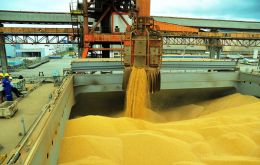MercoPress. South Atlantic News Agency
Tag: US Agriculture
-
Thursday, February 20th 2020 - 08:14 UTC
China back in the market for US agricultural commodities

China is back in the market for US agricultural commodities after issuing a list of products that will be eligible for tariff waivers, according to market sources. US exporters sold at least two sorghum cargoes to China after buyers bid for supplies to be shipped in the first half of the year. Importers also inquired about soybeans on Wednesday, a day after asking about wheat prices in a move that sent Chicago futures rallying.
-
Thursday, September 20th 2018 - 08:32 UTC
US supplants Brazil as leading supplier of soybeans to the European Union

The United States has supplanted Brazil as the European Union's top supplier of soybeans since a deal in July with President Donald Trump to avert a trade war, according to EU data seen by Reuters on Thursday.
-
Wednesday, April 11th 2018 - 18:35 UTC
Argentina imports 120.000 tons of soy-beans from United States

Argentina, the world’s third biggest soy producer, booked its largest purchase of U.S. soybeans in 20 years on Tuesday after drought cut its harvest, forcing crushers there to turn to imports. The surprise move pushed Chicago soybean futures to a one-month high, in the latest development to upend global soy trading after top buyer China last week proposed tariffs on U.S. imports amid an intensifying Washington-Beijing trade dispute.
-
Tuesday, April 3rd 2018 - 08:48 UTC
Brazil subsidized loans for the 2018/19 agriculture program will reach US$ 58bn

Brazil's Agriculture Ministry plans to increase funds available to finance the farm sector, an official announced, noting that a decline in inflation has allowed the government to boost funding in a country that is the world’s largest exporter of staples like soybeans and coffee.
-
Friday, February 23rd 2018 - 09:21 UTC
Mexico buying more Brazilian corn over concern with NAFTA negotiations

Mexican buyers imported ten times more corn from Brazil last year amid concern that NAFTA renegotiations could disrupt their U.S. supplies, according to government data and top grains merchants. Mexico is on track to buy more Brazilian corn in 2018, which would hurt a U.S. agricultural sector already struggling with low grains prices and the rising competitive threat from South America.
-
Friday, February 23rd 2018 - 09:13 UTC
Argentine farmers agree to pay royalties to seed companies like Monsanto

Argentine farmers have agreed to pay perpetual royalties when they replant genetically modified seeds made by companies like Monsanto Co, a deal that could allow farmers access to the newest biotechnology.
